Coda Technologies Coda No. 8 Amplifier and 07x Preamplifier Review by Richard Willie
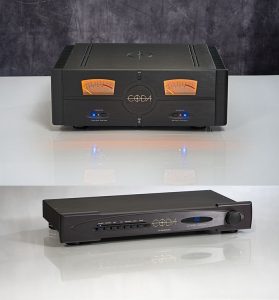
 It has been over a year since I had the privilege of evaluating the Coda Technologies CSiB integrated amplifier. My experience with Coda Technologies’ products continued. Soon after, I was allowed to review Coda’s separate components, the No. 8 Amplifier and 07x Preamplifier. Given the similarities between the No. 8/07x combo and the CSiB integrated amplifier, a comprehensive review of the No. 8 would be largely redundant to my previous evaluation of the CSiB. Instead, consider this a supplementary review of the Coda’s signature sound and exceptional product line, to be read in conjunction with my original review of the CSiB (reviewed here).
It has been over a year since I had the privilege of evaluating the Coda Technologies CSiB integrated amplifier. My experience with Coda Technologies’ products continued. Soon after, I was allowed to review Coda’s separate components, the No. 8 Amplifier and 07x Preamplifier. Given the similarities between the No. 8/07x combo and the CSiB integrated amplifier, a comprehensive review of the No. 8 would be largely redundant to my previous evaluation of the CSiB. Instead, consider this a supplementary review of the Coda’s signature sound and exceptional product line, to be read in conjunction with my original review of the CSiB (reviewed here).
In my earlier review, I found that the Coda Technologies CSiB delivers exceptional performance and sound quality, surpassing the capabilities of many preamplifier/amplifier systems. Despite my preference for warmer-toned equipment, I found the CSiB provided a transparent, colorful, and dynamic sound that was a revelation. I ultimately decided not to keep the CSiB as a reference due to the difficulty of reviewing separates with the integrated amplifier. Instead, I requested the No. 8/07x combo for review as a new reference. This ‘mini-review’ allowed me to explore the Coda sound signature further and compare the No. 8/07x combo to the CSiB. I was excited to see how the individual pieces stacked up and if they offered any distinct improvements over the integrated amplifier.
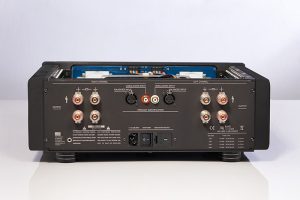
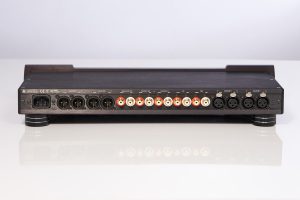
Integrated vs Separates
 Regarding audio systems, choosing between an integrated amplifier and a separate preamplifier and amplifier can be a matter of personal preference. Integrated amplifiers combine the functions of a preamplifier and amplifier into one unit, offering convenience and simplicity for those who value an all-in-one solution. On the other hand, separate preamplifiers and amplifiers are often favored by audiophiles for a couple of reasons. First, they offer superior performance compared to integrated amplifiers because the modular design of separates allows each component to be optimized for its specific function. This modular approach results in a more efficient and optimized system, as each component is designed to perform its specific task to the best of its ability.
Regarding audio systems, choosing between an integrated amplifier and a separate preamplifier and amplifier can be a matter of personal preference. Integrated amplifiers combine the functions of a preamplifier and amplifier into one unit, offering convenience and simplicity for those who value an all-in-one solution. On the other hand, separate preamplifiers and amplifiers are often favored by audiophiles for a couple of reasons. First, they offer superior performance compared to integrated amplifiers because the modular design of separates allows each component to be optimized for its specific function. This modular approach results in a more efficient and optimized system, as each component is designed to perform its specific task to the best of its ability.
Second, separates offer greater flexibility, as individual components can be upgraded as a sound system evolves, allowing for improved performance over time. Using separate components also allows for greater customization, as different preamplifiers and amplifiers can be matched and optimized for specific types of music or sound signatures, leading to a more personalized and improved listening experience. Suffice it to say, audio separates are often a popular choice among audio enthusiasts.
Regarding performance, the Coda Technologies CSiB integrated amplifier can undoubtedly hold its own as a reference-level component. However, as good as the CSiB is as an integrated amplifier, Coda’s No. 8 Amplifier and 07x Preamplifier, as separate components, surpass it.
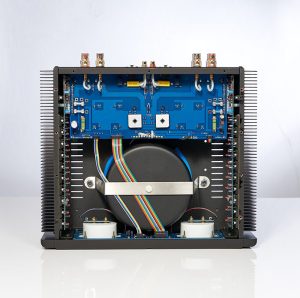
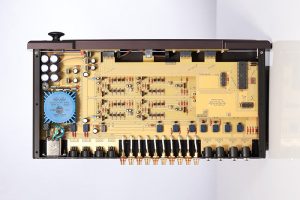
The Sound
 The Coda 07x preamplifier and No. 8 amplifier share many of the same components used in manufacturing the CSiB integrated amplifier. However, despite sharing many of the same components, when paired together, the No. 8 and 07x provide a richer, deeper sound and a touch warmer tone, offering a clear step up from the CSiB. The difference is not necessarily a matter of kind but rather a matter of degree.
The Coda 07x preamplifier and No. 8 amplifier share many of the same components used in manufacturing the CSiB integrated amplifier. However, despite sharing many of the same components, when paired together, the No. 8 and 07x provide a richer, deeper sound and a touch warmer tone, offering a clear step up from the CSiB. The difference is not necessarily a matter of kind but rather a matter of degree.
Examining the similarities and differences in the components used in each system is instructive. The Coda Technologies Continuum No. 8 Amplifier and the CSiB integrated amplifier share a chassis, output transistors, and power supply. Like the CSiB, the No. 8 comes in different variants, with varying levels of Class A bias and maximum outputs. The version of the No. 8 I am reviewing is V1, which operates in Class A up to the first 18 watts and Class AB up to 150 Watts into 8 Ohms. The No. 8 doubles its wattage output into 4 Ohms, doubles again in 2 Ohms, and still has significant power output into 1 Ohm, making it capable of handling a wide range of speakers.
Like the CSiB, the Coda No. 8 exudes an effortless and natural sound quality. With its ability to provide a smooth and pure presentation of music, the No. 8 offers a unique listening experience. Timbres and tonality are emphasized, making distinguishing between instruments and voices easy, resulting in a seamless flow of music. Not only does the No. 8 offer exceptional detail retrieval, but it does so without any harshness or glare. This creates a heightened sense of clarity, bringing the music closer to the listener. The No. 8 is also capable of creating a large and precise soundstage, offering a three-dimensional rendering of music that is truly remarkable. Also, like the CSiB, the No. 8 can easily pressurize a room with powerful bass when the recording calls for it. Indeed, the qualitative descriptions of the CSiB and the No. 8 sound signatures are consistent.
The preamplification sections of the two systems are much more distinct. The preamplifier section of the Coda Technologies CSiB integrated amplifier includes a gain section from the 07x preamplifier, which has proven to be successful. However, the preamplifier section also includes components from the CP preamplifier, making it a unique design that cannot be considered a perfect copy of the 07x. The combination of the 07x and CP preamplifier components results in a CSiB preamplifier section that is more different from the 07x than the same. Thus, it is the 07x that is likely responsible for a good deal of the difference in sound.
 The 07x preamplifier stands out from previous preamplifiers I have owned. For some time, I used the PS Audio DSD DAC as my reference, which has its own volume control section. My preference has traditionally been to use that DAC without a preamplifier. Most other preamplifiers introduce some form of degradation to the sound quality when placed between the PS Audio DSD DAC and the amplifier. This could manifest as a loss of detail, a decrease in the tightness and firmness of the bass, or a reduction in the clarity and engagement of the colors and tones. These colorations and smears on the music’s surface are common among other preamplifiers, detracting from the pure sound achieved when listening to the PS Audio DSD DAC alone. The 07x preamplifier, however, stands out from these preamplifiers by enhancing the sound quality, providing a more defined bass, and making the music more engaging throughout the audio band. These qualities are apparent in a couple of examples.
The 07x preamplifier stands out from previous preamplifiers I have owned. For some time, I used the PS Audio DSD DAC as my reference, which has its own volume control section. My preference has traditionally been to use that DAC without a preamplifier. Most other preamplifiers introduce some form of degradation to the sound quality when placed between the PS Audio DSD DAC and the amplifier. This could manifest as a loss of detail, a decrease in the tightness and firmness of the bass, or a reduction in the clarity and engagement of the colors and tones. These colorations and smears on the music’s surface are common among other preamplifiers, detracting from the pure sound achieved when listening to the PS Audio DSD DAC alone. The 07x preamplifier, however, stands out from these preamplifiers by enhancing the sound quality, providing a more defined bass, and making the music more engaging throughout the audio band. These qualities are apparent in a couple of examples.
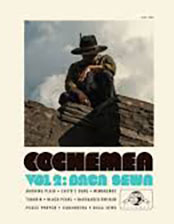 I first heard Burning Plain from Cochemea’s album Vol. II: Baca Sewa while rummaging through a bin of records at a vinyl store a couple of years ago. Through the Coda No. 8 and 07x, the intricacies of the percussive rhythms and the rich, deep tonality of the saxophone, which was full-bodied with a smooth and rounded quality, were brought to life with incredible detail and clarity. The soundstage was wide and precise, allowing each instrument to occupy its own space within the mix. The bass was tight and punchy, while the mids were warm and full. The No. 8 and 07x combination provided a true-to-life representation of the song, capturing the raw energy of the performance.
I first heard Burning Plain from Cochemea’s album Vol. II: Baca Sewa while rummaging through a bin of records at a vinyl store a couple of years ago. Through the Coda No. 8 and 07x, the intricacies of the percussive rhythms and the rich, deep tonality of the saxophone, which was full-bodied with a smooth and rounded quality, were brought to life with incredible detail and clarity. The soundstage was wide and precise, allowing each instrument to occupy its own space within the mix. The bass was tight and punchy, while the mids were warm and full. The No. 8 and 07x combination provided a true-to-life representation of the song, capturing the raw energy of the performance.
Experiencing the Chromatics cover of Neil Young’s “Into the Black” on their album Kill for Love through the Coda No. 8 and 07x preamplifier is captivating. The haunting vocals are the song’s centerpiece and seem to drift above the minimalistic instrumentation consisting of a pulsing synthesizer, piano, and guitar. The 07x preamplifier’s exceptional ability to reveal subtle details without compromising clarity and detail only heightens the sense of depth and involvement in the music. The soundstage is meticulously crafted, giving each instrument its own distinct space, allowing the listener to appreciate the intricate interplay between the elements. The clarity of the No. 8/07x combo brings the listener right into the heart of the song.
Conclusion
The Coda Technologies Continuum No. 8 Amplifier and 07x Preamplifier are reference-level components that set the standard in audio quality. The combination of the No. 8 and 07x provides a smooth, natural presentation of music with emphasized timbres and tonality in a sound unmistakably ‘Coda.’ The Coda Technologies Continuum No. 8 Amplifier and 07x FET Preamplifier reference level components are highly competitive with anything in the market near their price point. 

Specifications:
Price:
Continuum No. 8 – $6,200.00
07x FET Preamplifier – $7150.00
Continuum No. 8
- RATED POWER
- V1: 150 Watts x 2 into 8 Ohms
- 300 Watts x 2 into 4 Ohms
- Class A ~18 Watts
- BANDWIDTH
- DC or -3dB at 5 Hz through 100kHz, depending on input
- DISTORTION
- Less than .03% from 10Hz to 20kHz at 350 Watts both channels driven into 4 through 8 Ohms
- GAIN
- 26dB
- CURRENT CAPABILITY
- 150 Amperes peak
- SLEW RATE
- 50 Volts/microsecond
- INPUT IMPEDANCE
- 50k Ohms unbalanced/10k Ohms balanced
- OUTPUT IMPEDANCE
- .04 Ohms from 20Hz to 20kHz
- NOISE
- More than -116dB referenced to rated output
- POWER SUPPLY
- 3.0kVA toroidal transformer with independent rectifiers and 80,000 uF of capacitance
- DIMENSIONS
- Faceplate: 17 inches wide by 5.5 inches tall
- Chassis: 16.75 inches wide by 6 inches tall by 14 inches deep
- WEIGHT
- 62 lbs
- 20 individual output transistors per channel, with a combined power capability of 3,600 watts and 75 amps with a bandwidth of 10 MHz
- Damping factor of 200
- Distortion rating- .0089 % THD
- 1 Pair XLR Inputs
- 1 Pair RCA Inputs
07x FET Preamplifier
- Latest iteration of the ‘0’ series preamplifiers, featuring substantial active and passive component upgrades
- Balanced and unbalanced inputs and outputs
- Extremely low-noise circuitry with no overall feedback
- May be operated with included CODA universal remote control
- System logic remembers the most recent volume and balance settings for each input
- Wide bandwidth regulated supply with AC EMI and RFI line filter
- Double-sided gold-plated circuit boards
- All anodized chassis
- 10-year warranty / 5 year transferable
- Frequency Response: -3dB @ 5Hz to 200kHz
- Distortion: <.005% from 10Hz to 40kHz @ 5V peak into 600 Ohms or higher shunted by 1000pF
- Gain: Unbalanced Output: 12dB @ 1kHz Balanced Output: 46db @ 1kHz
- Maximum Output: 10V peak
- Noise: <110dB referenced to 1V output
- Input Impedance: 20kOhms
- Output Impedance: 50 Ohms non-reactive unbalanced 100 Ohms non-reactive balanced
- Crosstalk: 90dB @ 20kHz
- Dimension: 18” W x 9.75” D x 2.5” H
Website: https://coda.cc/
Stereo Times Masthead
Publisher/Founder
Clement Perry
Editor
Dave Thomas
Senior Editors
Frank Alles, Mike Girardi, Russell Lichter, Terry London, Moreno Mitchell, Paul Szabady, Bill Wells, Mike Wright, and Stephen Yan,
Current Contributors
David Abramson, Tim Barrall, Dave Allison, Ron Cook, Lewis Dardick, John Hoffman, Dan Secula, Don Shaulis, Greg Simmons, Eric Teh, Greg Voth, Richard Willie, Ed Van Winkle, Rob Dockery, Richard Doran, and Daveed Turek
Site Management Clement Perry
Ad Designer: Martin Perry



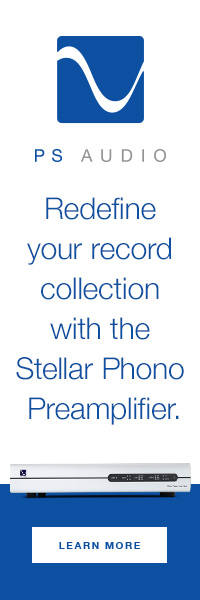
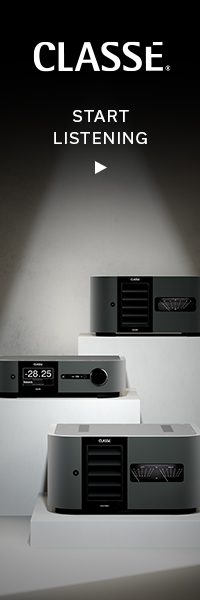
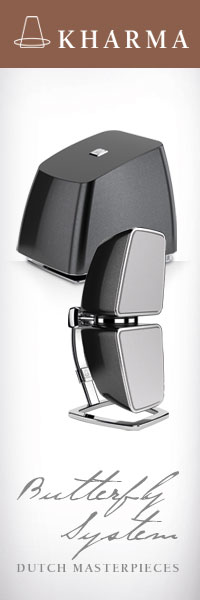
Be the first to comment on: Coda Technologies Coda No. 8 Amplifier and 07x Preamplifier Review by Richard Willie